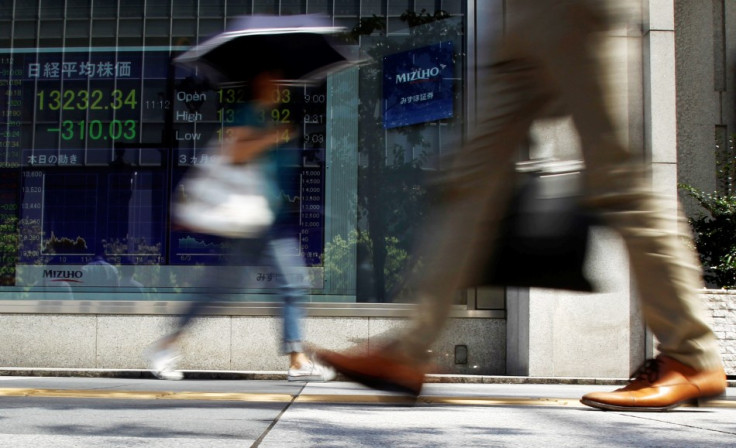Asian Markets Weekly Review: Kospi Outshines Regional Indices

Most stock markets across Asia finished the week lower. South Korea's Kospi led the pack while the Japanese Nikkei trailed.
For the month of August, most markets ended lower. The Shanghai Composite was ahead while the Japanese Nikkei lagged behind.
Most Asian markets logged gains at the beginning of the week after weak US home sales data restored hopes that the US Federal Reserve could maintain the current pace of its asset buys.
US economic data showed that Americans bought fewer homes in July than in June. Sales of newly built homes dropped 13.4% to 394,000 units, compared with 455,000 units in June. The July figure is the lowest for nine months.
Axel Merk, portfolio manager of Merk Funds told Reuters: "The fear is clearly that higher interest rates (are) going to topple (the) housing recovery, which means the Fed has to ease and not tighten." Merk Funds holds close to $500m in currency mutual-fund assets.
The Fed's FOMC is due to meet on 17 September and China warned the US Federal Reserve that it must contemplate the timing and the pace of its planned stimulus taper to prevent any detrimental knock-on effect on emerging market economies.
In company news, China Petroleum and Chemical (Sinopec) inched up 0.5% in Shanghai after it reported a 24% increase in its first-half profit. The company benefited from China's new pricing mechanism that permits the pricing of fuel products in line with the international market.
Markets witnessed choppy trade on 27 August as concerns surrounding potential US military intervention in Syria weighed on investor sentiment.
"If war does eventuate, higher fuel prices are going to add a third impact point to emerging markets as their currencies were smashed again overnight," said IG Markets strategist Evan Lucas, referring to the fall in the Indian rupee, the Brazilian real and the South African rand.
"Until markets gain some certainty on the attacks we will likely see short term volatility in equity and commodity markets," said Tim Radford, global analyst at Rivkin Securities.
In China, government data showed that the cumulative profits at major industrial firms rose 11.1% year-on-year during the January-to-July period. China looks set to hit its full-year growth target of 7.5%.
In company news, utility firm Tokyo Electric Power (Tepco) rallied 14%. The Japanese government said it could pledge funds for the clean-up efforts at the polluted Fukushima Daiichi nuclear power plant. Japan has a 350bn yen (£2.64bn, €2.27bn , $3.54bn) reserve fund that covers natural disasters and other emergencies.
Markets fell on 28 August in a global selling spree as market participants rushed to cut their risk exposure ahead of potential air strikes by the US and its allies against Syrian president Bashar al-Assad's regime.
"This selloff is a clear knee-jerk reaction by global market participants who are clearly reducing risk over fears the situation in Syria could deteriorate substantially. It's just a typical case of irrational fear driving investors' decision making," said Tim Radford, global analyst at Rivkin Securities.
"The best opportunity is to buy the fear driven selloff, and wait until global leaders restore certainty over the chemical attacks in Syria," Radford added.
Most markets opened higher on 29 August following upbeat cues from Wall Street and were supported by energy stocks that logged gains across the region after US benchmark crude oil prices hit $110 a barrel overnight.
Oil prices were boosted by the prospect of supply disruptions in the Middle East as the US and its allies prepare for potential air strikes against Assad's regime.
In company news, Tokyo Electric Power (Tepco) fell 6% after Japan's nuclear watchdog raised the severity level for the latest radioactive leak at the crippled Fukushima Daiichi nuclear power plant.
Markets were choppy on the final trading day as market participants exercised caution amid concerns surrounding the stability of emerging market economies and the prospect of US military intervention in Syria.
Weekly Market Movements
South Korea's Kospi finished 2.62% higher at 1,926.36.
The Shanghai Composite index finished 2.03% higher at 2,098.38.
Australia's S&P/ASX 200 finished 0.08% lower at 5,135.00.
Hong Kong's Hang Seng ended 0.91% lower at 21,731.37.
The Japanese Nikkei index ended 2.25% lower at 13,388.86.
The Week Ahead
The week ahead will see the China Federation of Logistics and Purchasing (CFLP) release the results of its August manufacturing purchasing managers index (PMI) survey.
HSBC will put out its August manufacturing and services PMI readings while the government will release non-manufacturing PMI data for the same month.
Japan will put out second-quarter GDP and capital expenditure data. The Bank of Japan (BoJ) will announce its interest rate decision and follow it up with a statement. BoJ will also put out the results of its monthly economic survey.
Australia will elect a new government at the end of the week.
The Reserve Bank of Australia will announce its interest rate decision and follow it up with a statement.
The Australian Industry Group will release the results of its August manufacturing sector survey.
Australia's statistics office will release second-quarter GDP data. It will also release annual building permits data for the month of July, alongside retail sales data for the same month.
© Copyright IBTimes 2025. All rights reserved.






















